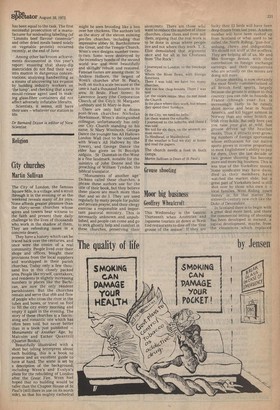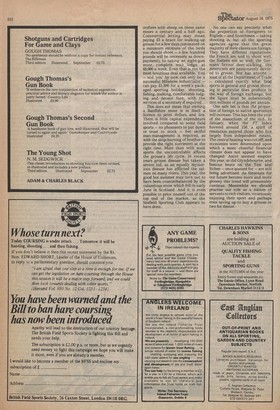Grouse shooting
Moor big business
Geoffrey Wheateroft
This Wednesday is the Gastric Thirteenth when American and Japanese tourists sit down at West End restaurants to dine off the 'first grouse of the season'. If they are
lucky their £3 birds will have been deep-frozen from last year. A token number will have been rushed up from Scotland or what used to be called the North Riding, 'gun-hot', unhung, chewy and indigestible. We should not scoff at the scoffers. They are helping all of us, Mr and Mrs Average Briton, with their contribution to foreign exchange earnings, and their compatriots who are actually on the moors are doing still more.
Grouse shooting is now certainly the most firmly commercialised of all British field sports, largely because the grouse is unique to this country; you can ride to hounds in France (though your fox is increasingly likely to be rabid), shoot moose and bear in North America, and kill bigger salmon in Norway than any other Scotch or Irish river holds. But only here can you raise your gun at wild, fast grouse driven up the heather moors. Thus it attracts ever-growing numbers of foreign sportsmen whose enthusiasm for our native sports grows in inverse proportion to most Englishmen's ability to pay for them. Over the last decade or two, grouse shooting has become more and more big business. This is :less true of the Yorkshire moors. Some syndicates may have dwindled as their members have watched the market slide; but a great part of Yorkshire land is still shot over by those who own it — local families, West Riding 'town money' or, for that matter the sixteenth-century new-rich like the Duke of Devonshire.
In Scotland there is to begin with a great deal more land, and there the commercial letting of shooting has been developed in earnest, a logical development, maybe, from the clearances which replaced
crofters with sheep on these same moors a century and a half ago. Commercial letting may mean paying £5 a brace for walking-up grouse for a few days (estimated on a minimum estimate of the birds you should shoot — a few hundred pounds will be necessary as downpayment), to taking an eight-gun moor, complete with lodge, at £8,000 a week. Even that is not the most luxurious deal available. You — and 'you' by now can only be a successful Milanese industrialist — can pay £1,500 for a week's packaged sporting holiday, shooting, fishing, stalking, comfortable lodging and decent fare, with the services of a secretary if required.
This does not mean that owning a Banffshire moor is in• itself a licence to print dollars and lire. There is little capital expenditure involved Compared to some field sports — no pheasants to put down or trout to stock — but skilful man-management is required, as with the strip-burning of heather to provide the right nutriment at the right time. More than with most sports the uncontrollable affects the grouse's life cycle. In recent years grouse disease has taken a severe toll, as an equally mysterious disease has afflicted the salmon on many rivers. This year, the good hot summer may turn out to have been counterbalanced by the calamitous snow which fell in early June in Scotland. And it is even possible to price oneself out of the top end of the market, as the Seafield Sporting Club appears to have done.
No one can say precisely what the proportion of foreigners to English — and Scotchmen — taking shooting is, but all the sporting agencies agree that the great majority of their clients are foreign. They have different reputations: the French are said to shoot well, the Italians not so well; the Germans favour deer-stalking, the Americans are passionately devoted to grouse. Nor has anyone — least of all the Department of Trade — calculated exactly what field sports in general and grouse shooting in particular does produce in the way of foreign exchange, but the figure must be substantially into millions of pounds per annum.
One safe bet is that the proportion of foreign to native sportsmen will increase. This has been the year of the masochism of the rich. In January, when the FT index hovered around 150, a spirit of resolution entered those who live largely from independent means. The central heating was cut off, and economies were determined upon which a more cheerful financial climate does not appear to have changed: Ascot seemed emptier this year, so did Glyndebourne, and famous beats on the Test and Itchen — once queued for — are still being advertised. As forecasts for our future become more and more gloomy this trend will presumably continue. Meanwhile we should practise our role as a nation of servants to rich visitors, vicariously enjoying their sport and perhaps even saving up to buy a grouse or two for dinner.



































 Previous page
Previous page